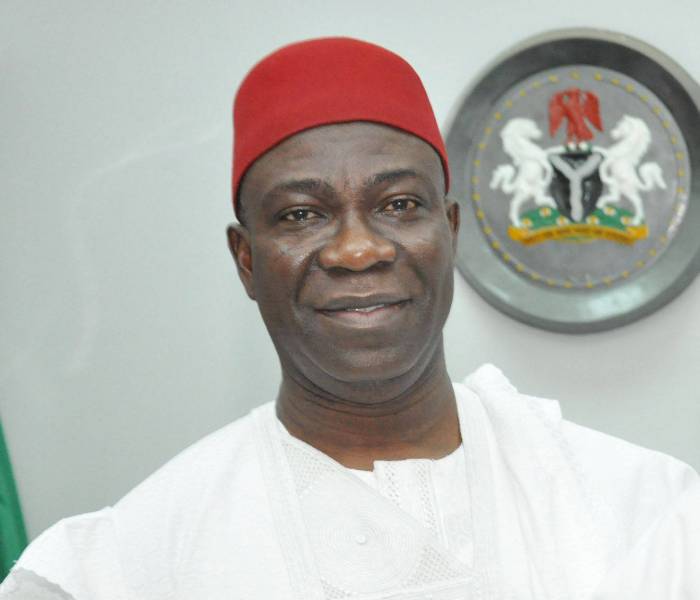
Ekweremadu: Dictatorial Tendencies, Nepotism Endangering African Democracies
The Deputy President of the Senate, Senator Ike Ekweremadu, has warned that democracy will be highly imperiled and transmute to civilian dictatorship without respect for key institutions of democracy by African leaders.
He decried the widespread coercion of the press, civil society, the judiciary, and parliaments by some African leaders, whom he said had no regard for their oaths of office and constitutional limits of their powers.
Ekweremadu spoke at a lecture entitled “African Politics: The Dynamics and Lesson”, which he delivered at the House of Commons, Parliament of the United Kingdom (UK).
The former Speaker of the Parliament of the Economic Community of West African States, ECOWAS Parliament, regretted that “outside Nigeria, South Africa, and a few others, most African parliaments are largely caged and often reduced to rubber stamps and appendages of the executive”.
He cited the case of Cameroon where the constitution had been severally amended to keep 84 years old President Paul Biya in power since November 1982 and Uganda where the parliament recently voted to remove the constitutional age limit to elongate the tenure of 73 years old President Yoweri Museveni, who has been in office for about 30 years.
He, however, commended the judiciary for critical interventions to save democracy in Nigeria’s intra-party dispute as well as the Gambian, Kenyan and Liberian presidential elections.
“The Judiciary is not only the last hope of the common man in Africa, but also the prized hope of democracy, rule of law, human rights, equity, and justice. Take away an independent judiciary and what you have left is crude dictatorship.
“Lately, the Supreme Court of Nigeria saved democracy in the country in its judgment on the Peoples Democratic Party, PDP, crisis when it held that the decision of a party in its national convention is final and binding.
“Also, after the PDP lost election in Nigeria in 2015, the APC-led government ran riot and began to indict, arrest, investigate, and detain its opponents and individual enemies. The judiciary was its major roadblock.
“In response to its frustration, the houses of judges were embarrassingly raided at midnight and judicial officers humiliated by security agencies working for the Federal Government of Nigeria.
“Such executive lawlessness must be condemned in strongest terms and must not be allowed to find a sanctuary in African politics”, Ekweremadu added.
Ekweremadu also deplored the harassment of social media users, online bloggers and publishers in parts of Africa, such as Nigeria, noting also that efforts to enact an Act to regulate Non Governmental Organisations (NGOs) was unhealthy for democracy.
He said “It is even quite hypocritical that former opposition leaders and parties rise to power, but only to turn round, determined to break and burn the very ladder with which they climbed unto power”.
Ekweremadu identified nepotism and the refusal of many presidents to abide by their oaths of office to uphold the provisions of the constitution, do justice to all manner of people, and not allow private interest to influence official decision as a present threat to democracy in the continent.
“Contrary to the oaths, what we see is blatant nepotism, cronyism, and tribalism. The ethnic groups of the heads of state are mostly favoured in appointments, opportunities, and provision of infrastructure.
“In Nigeria, Section 14 (3) of the 1999 Constitution tries to guarantee equity and justice for all given the nation’s vastness, plurality, and history vide the federal character principle, but no Igbo man or woman is considered fit by the present administration in Nigeria to head any of the security agencies, including paramilitary agencies even though the Igbo people remain one of the three major tribes in Nigeria.
“This has given rise to the feelings of alienation and agitations as championed by several pro-Biafra groups”, he added.
He also cited the emasculation of the English-speaking part of Cameroon under President Biya and the alleged favouratism towards the Zulus by President Jacob Zuma in South Africa, urging African leaders to be all embracing.
Speaking, the chief host of the event and Member of the UK Parliament, Rt. Hon Keith Vaz, described the event as the first of its kind, stressing that Africa was looking up to Nigeria to show leadership.
On his part, the President, Enugu Diapora, UK and Ireland, Prof. Joe Ukemenam, assured that the Nigerian diaspora community was willing to lend support to Africa.






